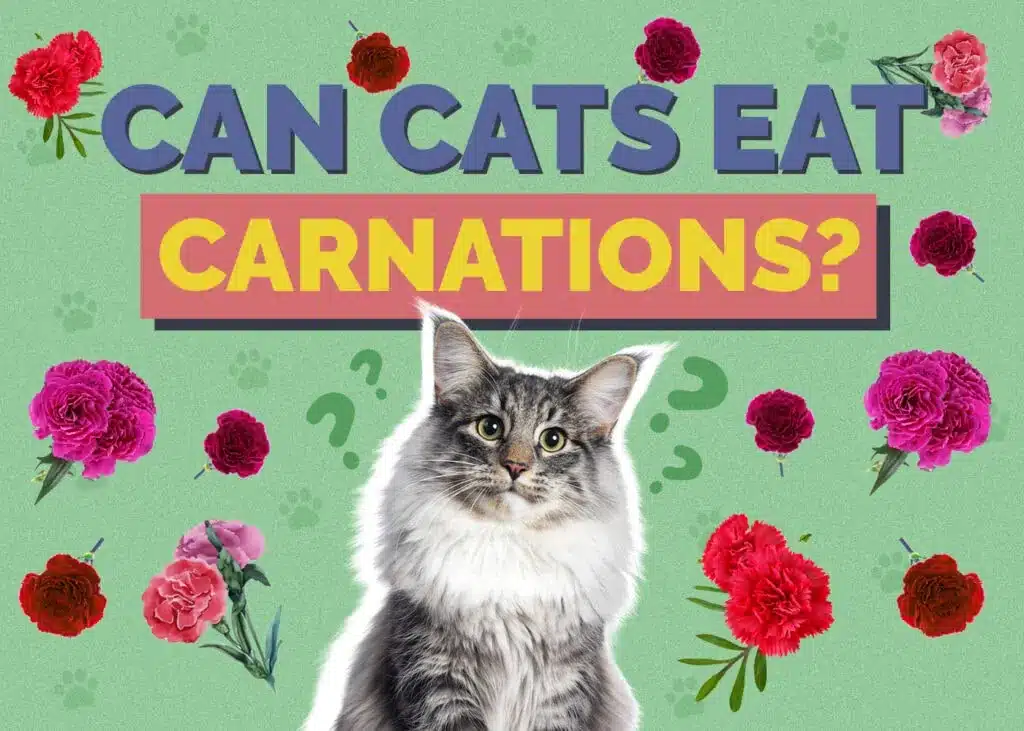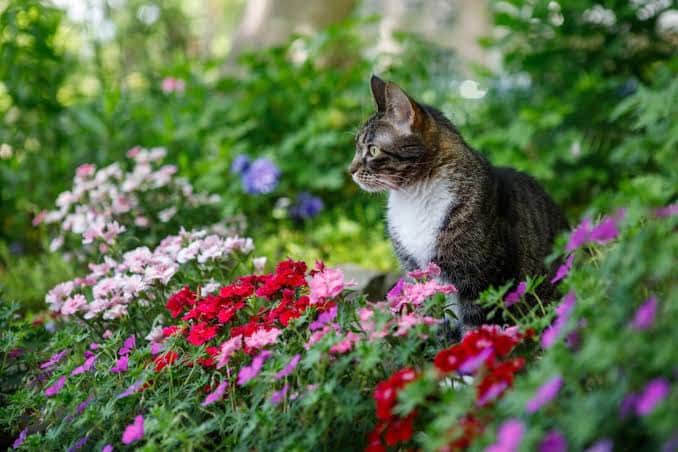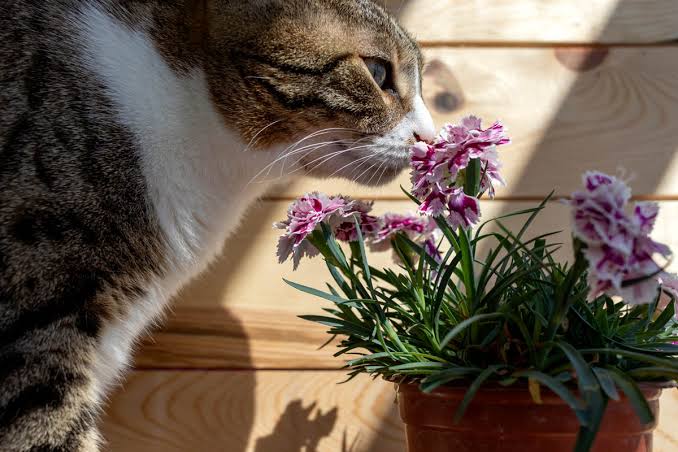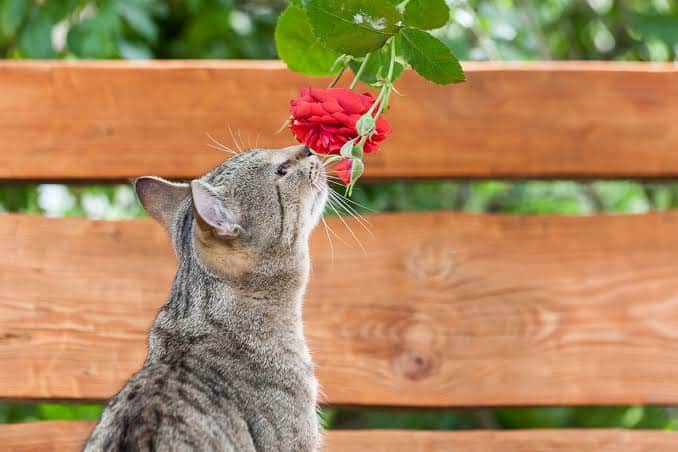Is the safety of your Cat your utmost priority? Then, you should go through this article. In this blog, we shall answer the question “Are Carnations Toxic To Cats?”. Also, we shall discuss these subtopics; Overview Of Carnations, Types And Varieties Of Carnations, Carnations And Cat Health, Understanding Carnation Components, etc.
Understanding the risks associated with these popular flowers ensures a healthier and happier life for your beloved cats. Let’s navigate the world of flora and feline safety together.
Overview Of Carnations
Carnations, often referred to as “The Flowers of the Gods,” are timeless blooms with a rich history and diverse symbolism. Also, Carnations have a fascinating history, dating back over 2,000 years.
Originating in the Mediterranean region, these flowers were cherished by ancient civilizations, such as the Greeks and Romans, for their aromatic fragrance and stunning appearance. Over the centuries, carnations have become emblematic of love, fascination, and distinction.
See Also: Are Lilies Toxic To Cats: Find Out If Lilies Affects Your Cat

Types And Varieties Of Carnations
Carnations, beloved for their beauty and symbolism, come in a plethora of types and varieties. Below are the fascinating spectrum of these blooms and their unique characteristics.
1. Standard Carnations
Also known as the “Clove Pink,” Standard Carnations are the classic choice. With large, ruffled blooms and a rich fragrance, they embody timeless elegance. These flowers are often chosen for traditional arrangements and symbolize love and fascination.
2. Mini Carnations
Perfect for adding delicate touches to bouquets, Mini Carnations feature smaller blooms but share the same captivating charm. They come in various colors and are popular for arrangements that require a daintier touch.
3. Spray Carnations
Spray Carnations, or Cluster Carnations, showcase multiple smaller blooms on a single stem. This variety is a favorite for creating lush and voluminous arrangements, making them a go-to choice for celebratory bouquets.
4. Dwarf Carnations
Compact and charming, Dwarf Carnations are well-suited for smaller spaces and container gardens. Despite their diminutive size, they boast vibrant colors and intricate petal patterns, making them a delightful addition to any setting.
5. Picotee Carnations
Picotee Carnations stand out with their distinctive petal edges, often featuring a contrasting color. This adds a touch of drama and uniqueness to bouquets, making them a favorite for those seeking a more intricate floral display.
6. Border Carnations
With a delightful fragrance and a medium-sized bloom, Border Carnations are versatile and often used for edging flower beds or borders. They come in various colors, providing an opportunity to create visually stunning arrangements.
7. Florigene Carnations
Engineered for captivating color, Florigene Carnations are genetically modified to express hues not commonly found in nature, such as blue and violet. These unique blooms have gained popularity for their striking appearance and modern appeal.
8. Green Carnations
Adding a touch of the unusual, Green Carnations are sought after for their distinctive color. While not a natural shade for carnations, these blooms are often used to create unconventional and eye-catching arrangements.
See Also: Are Snake Plants Toxic To Cats: See How Snake Plants Can Affect Cats

Carnations And Cat Health
Carnations, when ingested by cats, can pose a risk due to certain compounds present in the plant. The primary concern is the oils and compounds that may cause mild gastrointestinal upset in felines. Although carnations are generally considered low in toxicity compared to some other plants, it’s crucial to be cautious and mindful if you have curious cats at home.
Common Symptoms In Cats
If a cat has ingested carnations or been exposed to them, several common symptoms may manifest:
- Vomiting: One of the initial signs of potential carnation toxicity in cats is vomiting. Keep an eye on your cat’s behavior, and if frequent vomiting occurs, it’s advisable to seek veterinary attention.
- Drooling and Salivation: Excessive drooling or salivation can be an indicator of discomfort or ingestion of a substance that may not agree with the cat’s digestive system.
- Lethargy: A cat that has ingested something potentially toxic may show signs of lethargy or lack of interest in usual activities. Monitor your cat’s energy levels for any noticeable changes.
- Loss of Appetite: Refusal to eat or a sudden loss of appetite can be a red flag. If your cat displays reluctance to consume its regular meals, it’s crucial to investigate the cause.
See Also: Grey and White Cat Breeds
Understanding Carnation Components
Carnations, with their vibrant hues and delicate petals, may seem harmless, but it’s essential to delve into the chemical makeup of these flowers, particularly for those with feline companions. In this exploration, we break down the components of carnations and discuss how specific chemicals may pose risks to feline health.
Chemical Composition Of Carnations
Carnations contain various compounds, and understanding their composition is crucial for assessing potential risks to cats. Some of the key components include:
- Essential Oils: Carnations produce essential oils, which contribute to their distinct fragrance. However, certain essential oils can be irritating to a cat’s digestive system if ingested.
- Flavonoids: These are natural plant pigments found in carnations. While flavonoids have antioxidant properties, some may interact with a cat’s system, leading to adverse effects.
- Alkaloids: Carnations may contain alkaloids, which are nitrogen-containing compounds. In certain quantities, alkaloids can be toxic to cats and may contribute to symptoms of discomfort.
Linking Components To Feline Health Risks
The potential risks to feline health arise from the interaction of these components with a cat’s digestive and metabolic systems. Here’s how specific components may pose risks:
- Gastrointestinal Upset: Essential oils in carnations can lead to mild gastrointestinal upset in cats, causing symptoms like vomiting and diarrhea.
- Allergic Reactions: Flavonoids and other compounds may trigger allergic reactions in some cats. It’s essential to monitor for signs of allergies, such as itching, swelling, or respiratory distress.
- Toxicity from Alkaloids: Excessive ingestion of alkaloids can lead to toxicity in cats, manifesting as more severe symptoms like lethargy, difficulty breathing, and even more serious health complications.

Real-life Instances And Pet Owner Experiences
Real-life instances of cats encountering carnations offer valuable insights into the potential risks and lessons learned by pet owners.
1. Curiosity and Carnations: A Common Theme:
Many cat owners have shared anecdotes about their feline friends displaying curiosity towards carnations. Cats, known for their inquisitive nature, may explore and sometimes nibble on plants within their reach, including carnations.
2. Mild Reactions and Vigilant Observations:
Several stories highlight instances where cats exhibited mild reactions after interacting with carnations. Symptoms such as temporary gastrointestinal upset, including vomiting or mild lethargy, were reported. Vigilant pet owners, quick to notice changes in behavior, were able to address these issues promptly.
3. Allergies and Sensitivities:
In some cases, cats developed allergies or sensitivities to specific components in carnations. Pet owners shared stories of their cats experiencing itching, swelling, or other allergic reactions. These incidents emphasize the importance of recognizing and managing potential sensitivities in feline companions.
4. Severe Cases and Emergency Responses:
While uncommon, a few stories detailed more severe cases where cats ingested larger quantities of carnations, leading to toxicity. Emergency responses, including prompt veterinary attention, were crucial in these situations. These instances underscore the need for immediate action when faced with potential risks.
5. Lessons Learned from Pet Owners:
Pet owners who navigated these experiences often shared valuable lessons:
- Plant Awareness: Understanding the plants within your home environment, including carnations, is essential for responsible pet ownership. Being aware of potential risks allows for proactive measures.
- Quick Intervention: Realizing the importance of swift action, pet owners emphasized the need to intervene promptly if a cat exhibits unusual behavior or shows signs of discomfort after interacting with carnations.
- Consulting Veterinarians: The stories consistently underscored the significance of consulting veterinarians for professional guidance. Seeking expert advice ensures accurate assessments and appropriate actions tailored to the specific situation.
See Also: Benefits of Having a Cat bed

Veterinarian Insights And Professional Advice
Here, we shall look into the world of pet health with expert guidance. You will get valuable insights and practical advice to ensure your beloved companions live happy, healthy lives.
1. The Importance of Regular Check-ups
Regular veterinary check-ups are the cornerstone of preventive pet care. Learn how routine visits can detect potential issues early, keeping your furry friends in top-notch condition.
2. Nutrition Know-How
Explore the intricacies of pet nutrition with our veterinarians. Uncover the essential components of a well-balanced diet tailored to your pet’s specific needs, promoting optimal health and vitality.
3. Common Ailments and Symptoms
Gain a deeper understanding of common pet ailments and their telltale signs. Our veterinarians provide insights into recognizing symptoms early, empowering you to take prompt action for your pet’s well-being.
4. Vaccination Demystified
Delve into the world of pet vaccinations as our experts break down the importance of immunization. Learn about the recommended schedules and understand how vaccinations safeguard your pet against prevalent diseases.
5. Behavioral Wellness
Explore the nuances of your pet’s behavior and understand how to address common behavioral issues. Our veterinarians offer practical tips for fostering a positive and enriching environment for your furry friends.
See Also: The Top 9 Best Cat Feeders in 2024
Conclusion
While carnations themselves are generally considered non-toxic to cats, it’s crucial to be aware of potential risks associated with certain aspects.
The green light on carnations doesn’t mean we should throw caution to the wind. Factors like additives in flower arrangements, pesticides, or other plant varieties could pose risks. Always exercise caution and consult with your veterinarian if you suspect your cat has ingested any part of a carnation or displayed unusual behavior.
Remember, our furry companions rely on us to create a safe environment. Stay informed, observe your cat’s behavior closely, and take swift action if any signs of distress arise. The journey to keeping our pets safe is an ongoing one, and your attentiveness plays a vital role.
